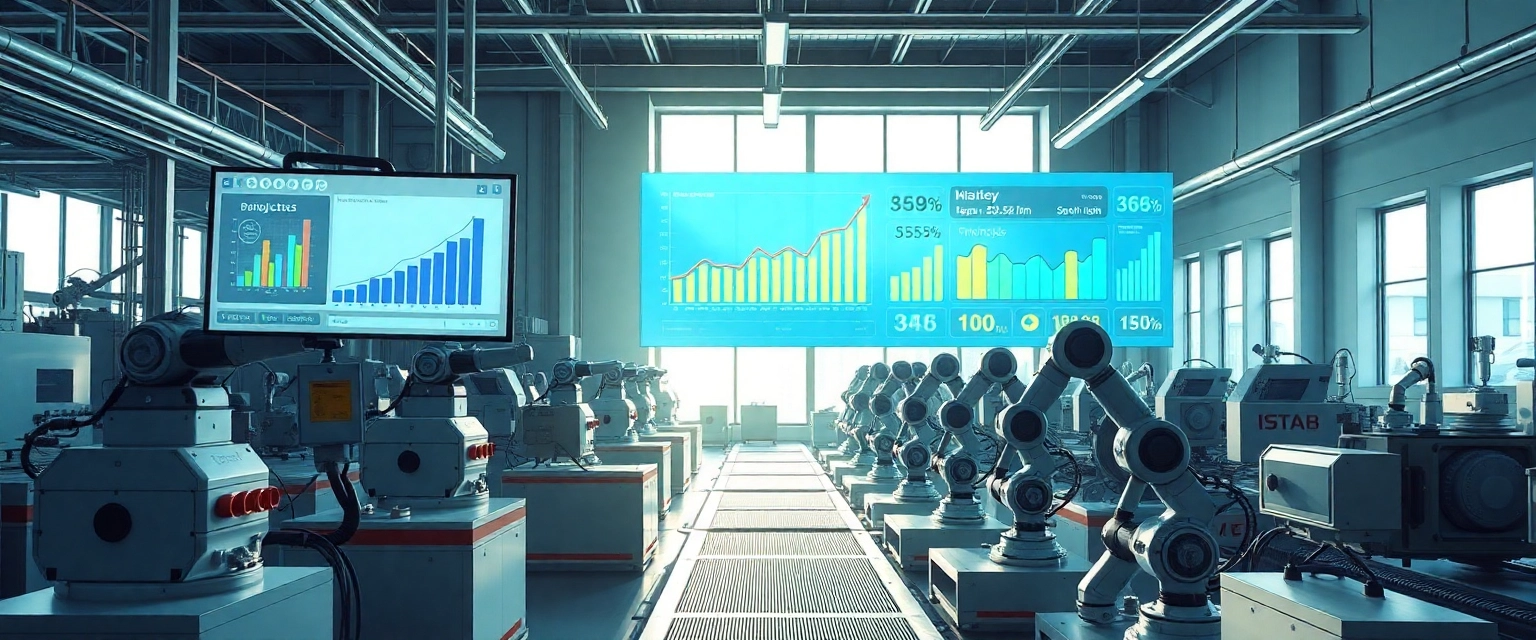Unlocking cost savings: How AI transforms manufacturing efficiency and slashes expenses

The Role of AI in Cost Reduction at a Manufacturing Firm
Brief Context
In the relentless world of manufacturing, where every second counts and every penny matters, a silent revolution is taking place. The emergence of artificial intelligence (AI) is not just a trend; it's a transformative force that is redefining the parameters of success. Just imagine a factory floor where machines learn to predict breakdowns, supply chains evolve in real-time, and production processes become so efficient that costs plummet like a lead balloon. Welcome to the age of AI in manufacturing.
Why the Topic is Important
The manufacturing sector sits on the razor's edge of competition. With profit margins that can be painfully thin, every dollar saved is a battle won. Efficiency, flexibility, and sustainability are not merely buzzwords; they are pivotal for survival in an increasingly volatile market. As we delve into the labyrinth of AI's role in cost reduction, we will uncover how this technology is not just enhancing productivity but reshaping the entire industry landscape.
AI in Manufacturing Cost Reduction
Optimizing Supply Chain Management
Let’s kick things off by tackling one of the most significant levers for cost reduction: supply chain management. Picture this: a manufacturing firm that adapts its production schedules based on real-time market demand. Sounds ideal, right? Thanks to AI, this is not just wishful thinking.
-
Predictive Analytics: AI algorithms excel at sifting through mountains of historical data to forecast demand accurately. Remember the insightful report from McKinsey? It states that AI-driven demand forecasting can reduce errors by 20-50%. This precision allows manufacturers to align their production schedules precisely with market needs, minimizing overproduction and slashing inventory costs. Imagine the satisfaction of your customers when you consistently hit that sweet spot of availability without excessive stock!
-
Supplier Relationships: Enter AI-driven tools that provide deeper insights into supplier performance and risks. Imagine automating your communication and order processing. That’s right! This strengthens relationships and creates a more responsive supply chain. It’s as if your suppliers are reading your mind.
-
Route Optimization and Logistics: Consider the logistics side of things. AI works tirelessly to optimize delivery routes, saving time and fuel. A study by Capgemini reveals that these enhancements can cut logistics costs by 5 to 10%. Think of it as your transportation network working like a well-oiled machine, orchestrated by the maestro known as AI.
Enhancing Production Efficiency
As we move from the supply chain to the heart of manufacturing—the production floor—AI continues to shine.
-
Predictive Maintenance: Have you ever experienced the frustration of an unexpected machine breakdown? AI offers a lifeline here. It predicts equipment failures before they occur, potentially slashing maintenance costs by up to 20%. IBM’s estimates suggest this approach could reduce unplanned outages by 50% and extend the lifespan of aging assets. Imagine being able to sleep soundly at night while your machines communicate their health status.
-
Quality Control: When it comes to quality, AI does not play games. AI-empowered systems leverage machine vision to detect defects with an accuracy that far surpasses the human eye. It’s like having a team of eagle-eyed experts watching over your production line. Defective items sorted out automatically mean less waste and, ultimately, lower costs.
-
Process Optimization: Here’s where AI truly becomes a game-changer. It analyzes workflow patterns and offers suggestions for immediate improvement. Picture your production lines flowing smoothly with fewer delays, akin to a finely tuned orchestra.
Reducing Waste and Resource Usage
Now, let’s pivot our gaze towards sustainability, a hot topic in manufacturing. AI proves it can be a powerhouse not just for profits but for the planet.
-
Resource Management: Imagine deploying AI to optimize resource allocation. By 2021, firms integrating AI into their resource management strategies reported reductions in resource use by up to 40%. That’s both a cost-saving and an eco-friendly move.
-
Energy Efficiency: AI isn’t just smart; it’s wise. Machine learning algorithms can analyze energy consumption patterns and predict peak times, ensuring that high-energy processes occur during off-peak hours. A savvy way to cut costs!
-
Waste Reduction: With enhanced precision, AI minimizes material waste. Think of it as a wise old sage guiding your production processes, ensuring that every resource is utilized effectively, with no room for excess.
Customizing Manufacturing Processes
As consumer preferences shift like the wind, manufacturers must adapt or risk losing relevance. Here, AI's adaptable nature shines through.
-
Mass Customization: AI enables mass customization, allowing manufacturers to produce personalized products at scale without exorbitant expense. Imagine your customers getting exactly what they want, exactly when they want it—a winning formula.
-
Adaptive Manufacturing Systems: Ever heard of adaptive manufacturing? Thanks to AI, production systems can adjust on the fly to accommodate late-stage changes. It’s like a dance—fluid and responsive, but executed with flawless precision.
Improving Workforce Efficiency
The human element remains indispensable on the factory floor. While AI may evoke fears of job loss, it simultaneously offers unprecedented opportunities for augmenting human capabilities.
-
Augmented Reality (AR): Picture a worker equipped with AR technology, receiving real-time data and instructions superimposed on their visual field. It’s a futuristic scene, enhancing performance while reducing errors. An exciting prospect, right?
-
Task Automation: Repetitive tasks are the nemeses of productivity. AI can automate these mundane duties, freeing up workers to focus on higher-value tasks. According to Deloitte, this can boost productivity by 10 to 15%. It’s a win-win: workers feel empowered, and firms reap the rewards.
-
Training and Development: Think about identifying skills gaps within your workforce. AI can tailor training programs accordingly and efficiently track progress, equipping teams for the challenges ahead—like having a personal coach for every employee.
With AI swiftly making its mark across these dimensions, manufacturing firms are no longer just keeping pace; they're redefining innovation. As we embark on this epic exploration of how AI can revolutionize the manufacturing landscape, one thing is crystal clear: the future is bright, and the savvy companies will be those who embrace this transformative technology.
Leveraging AI for Pricing Optimization
As we explore further into the depths of AI's role in the manufacturing landscape, let's turn our attention to pricing—the fine line between profit and loss. With AI at the helm, manufacturers are finding smarter ways to navigate this critical aspect of business.
-
Dynamic Pricing Models: One of the most compelling advantages of AI is its capability to implement dynamic pricing. Imagine being able to adjust your prices in real-time, reflecting market conditions and customer demand. Companies that sell directly to consumers can leverage AI-driven pricing algorithms to remain competitive in ever-changing environments. No more guessing games!
-
Cost Analysis and Product Pricing Strategies: With AI, manufacturers can conduct comprehensive cost analyses, considering various components and price elasticity to formulate pricing strategies. This strategic prowess ensures that prices are not just competitive but also sustainable. The insights derived can mean the difference between a profitable quarter and a costly oversight.
Enhancing Customer Engagement and Satisfaction
In today’s fast-paced market, customer satisfaction is paramount. AI not only streamlines operations, but it also enhances how companies engage with their customers.
-
Chatbots and Virtual Assistants: Picture an AI-powered chatbot capable of answering queries 24/7. Customers appreciate the immediacy of information, and manufacturers who implement these solutions see a marked improvement in customer service. Chatbots can handle routine inquiries, allowing human agents to tackle more complex issues, ultimately enhancing the customer experience.
-
Sentiment Analysis: AI excels at combing through customer feedback, extracting valuable insights about sentiments and service satisfaction. By analyzing reviews and social media chatter, manufacturers can adapt their strategies in real-time. This insight equips businesses to respond proactively rather than reactively— a crucial edge in today’s market.
Conclusion of the Journey
As we’ve journeyed through the multifaceted role of AI in manufacturing, it’s abundantly clear: this is more than a trend—it's a revolution. AI is not merely a tool; it's a transformative ally that empowers businesses to optimize supply chains, enhance production efficiency, reduce waste, and tailor processes to meet customer desires. The power of AI extends into pricing optimization and fortifying customer engagement, making it indispensable for those seeking to thrive in a competitive landscape.
To emerge victorious, manufacturers must embrace this technology—not as a replacement for human effort but as a means to augment it. By harnessing the analytical capabilities of AI, firms can glean insights that drive better decision-making and resource allocation.
Moreover, as industries evolve, accountancy is no exception. Enter AI Accountant, a specialized service tailored for the accounting field. This innovative platform helps accountants find answers faster, access laws and regulations quickly, and automate tasks—much like a specialized analogue of GPT for accounting professionals. Such tools exemplify how AI continues to bridge gaps across various sectors.
In conclusion, as we navigate this brave new world, those who start integrating AI into their manufacturing processes today will set the pace for success tomorrow. The tools and technologies are at our fingertips—let’s grasp them and sculpt a future marked by efficiency, sustainability, and unparalleled customer satisfaction.
Useful Resources
- For deeper insights into AI in manufacturing, visit McKinsey Insights.
- Explore more about AI-driven solutions by checking Capgemini Insights.
- For accounting professionals, discover the power of AI at AI Accountant.
As the curtain falls on this exploration, remember: the future is not about AI replacing human ingenuity; it’s about enhancing it for a smarter, more efficient tomorrow.


